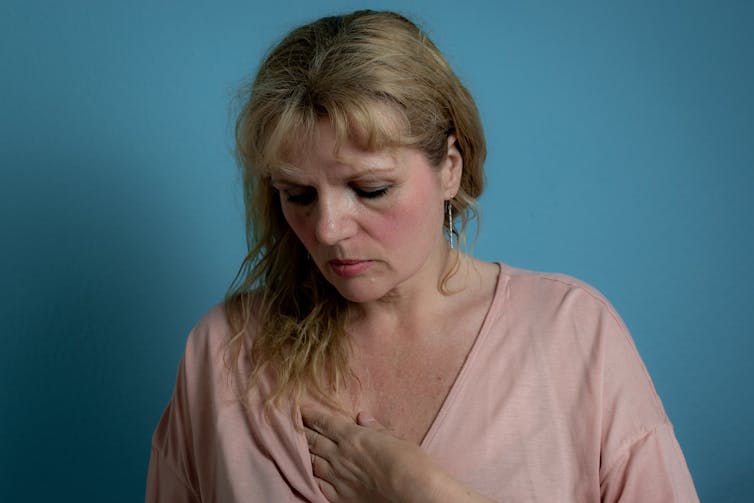Early menopause diagnosis article from THE CONVERSATION
‘It changed who I felt I was.’ Women tell of devastation at early menopause diagnosis

Rhonda Garad, Monash University and Amanda Vincent, Monash University
For Mary*, being told she’d entered menopause much earlier than expected was a shock …
It was sort of like I’d gone from 39 […] instead of turning 40, I’d almost turned 80. So I’d sort of skipped 40 years.
Around 10% of women – including many who believe they have the prospect having children ahead of them – are suddenly told they are at the end of their fertile life, and at greater risk of diseases normally associated with middle age.
In the course of our work with women and research, hundreds of women have shared their experiences of early menopause. They provide insights into how the physical changes have affected their sense of self and their relationships.
What is early menopause?
Menopause refers to the time in a woman’s life when the ovaries stop producing eggs, periods stop, and oestrogen levels dramatically drop.
The usual age of menopause, defined as 12 months without periods, is around 51 years. Early menopause occurs before 45 years. Premature menopause or premature ovarian insufficiency (POI), occurs before age 40.
Early menopause can happen without warning and the causes may never be known; although a family history of POI, autoimmune disease, smoking, early development and social factors are risk factors. It can also result from medical care such as chemotherapy, radiotherapy or the surgical removal of both ovaries. Except for women who have their ovaries removed, predicting who will experience early menopause is very difficult.
Hot flushes, night sweats and the rest
The symptoms of early menopause can be similar to those associated with usual menopause (hot flushes, night sweats, mood changes, vaginal dryness, sleep disturbance, sexual problems, fatigue, joint pain, and brain fade), but happen to much younger women and may be more severe. The problem is that no one expects young women to be experiencing menopausal symptoms.
Some women may not have any menopausal symptoms and only experience their periods stopping without warning. Others discover they are unable to become pregnant. Sonia* remembers:
Around 35, 36 I started to skip periods […] I just thought it was stress and overwork, and that sort of thing. But then the gaps between periods got longer and longer, and I started to experience night sweats. And I became concerned at that point, not because I thought that I was going through menopause – it didn’t occur to me.
Although we think of oestrogen as a reproductive hormone, it also plays an important role in brain function, particularly memory. Women who experience early menopause often report frustration at not mentally performing in the way they used to, and also find mood changes difficult to cope with. The cause of early menopause (such as chemotherapy) and the symptoms experienced (like sleep disturbance) can also impact thinking and mood.
Feeling less than sexy
Early menopause can affect sexual function in many ways. Vaginal dryness can cause pain with sexual intercourse. Women often say they lose desire for sex, which can strain intimate relationships.
Cathy told us she wanted to be left alone:
It changed who I felt I was […] It’s hard to be sexy when you’re cranky […] To think of yourself as a sexual being [is difficult] when you are experiencing hot flushes every hour and you’re going, ‘I don’t want anyone near me. All I want to do is feel cool.‘

Losing a future family
For many women who go through early menopause the sudden lose of fertility can be devastating. Jenni remembers going through menopause at an age when many of her peers were becoming parents:
Watching the joy my friends were experiencing getting pregnant and giving birth, felt like a special kind of hell. I was so happy for them, but I had to distance myself because it was just too hard.
Women describe feelings of shock and trauma after being told they were infertile. They feel grief for the children they had hoped to have.
Rarely, women with spontaneous POI will conceive. For the majority, pregnancy is only possible with assisted reproduction technology using donor egg or embryo.
No cure but symptoms can be treated
There is no cure for early menopause and no way to restore egg production. Instead, the focus of treatment is on managing symptoms and the increased risks of bone and heart disease after menopause.
Hormone replacement therapy (HRT) is usually recommended up until the age of usual menopause to manage symptoms and reduce your risk of heart disease and osteoporosis. The risks of taking HRT seen in older women do not necessarily apply to younger women. Consult with your doctor about the best HRT for you.
If you have not had a period for 4-6 months (and you are not pregnant or on treatment that stops periods) then you should see your doctor about whether you may be experiencing early menopause or POI. You can also find doctors who have a special interest in women’s health and menopause.
We developed the AskEarlyMenopause website and app to provide accurate information and a discussion forum for women to share experiences and get expert advice.
*Names changed for privacy![]()
Rhonda Garad, Senior Lecturer and Research Fellow in Knowledge Translation, Monash University and Amanda Vincent, Adjunct Clinical Associate Professor and Endocrinologist, Monash University
This article is republished from The Conversation under a Creative Commons license. Read the original article.
![]()
